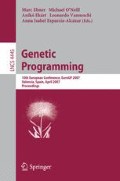Abstract
The conversion and extension of the Incremental Pareto-Coevolution Archive algorithm (IPCA) into the domain of Genetic Programming classification is presented. In particular, the coevolutionary aspect of the IPCA algorithm is utilized to simultaneously evolve a subset of the training data that provides distinctions between candidate classifiers. Empirical results indicate that such a scheme significantly reduces the computational overhead of fitness evaluation on large binary classification data sets. Moreover, unlike the performance of GP classifiers trained using alternative subset selection algorithms, the proposed Pareto-coevolutionary approach is able to match or better the classification performance of GP trained over all training exemplars. Finally, problem decomposition appears as a natural consequence of assuming a Pareto model for coevolution. In order to make use of this property a voting scheme is used to integrate the results of all classifiers from the Pareto front, post training.
Access this chapter
Tax calculation will be finalised at checkout
Purchases are for personal use only
Preview
Unable to display preview. Download preview PDF.
References
de Jong, E.D.: The incremental pareto-coevolution archive. In: Deb, K., et al. (ed.) GECCO 2004. LNCS, vol. 3102, pp. 525–536. Springer, Heidelberg (2004)
Folino, G., Pizzuti, C., Spezzano, G.: Ensemble techniques for parallel genetic programming based classifiers. In: Ryan, C., Soule, T., Keijzer, M., Tsang, E.P.K., Poli, R., Costa, E. (eds.) EuroGP 2003. LNCS, vol. 2610, pp. 59–69. Springer, Heidelberg (2003)
Gathercole, C., Ross, P.: Dynamic training subset selection for supervised learning in genetic programming. In: Davidor, Y., Männer, R., Schwefel, H.-P. (eds.) Parallel Problem Solving from Nature - PPSN III. LNCS, vol. 866, pp. 312–321. Springer, Heidelberg (1994)
Jong, E.D.: Towards a bounded pareto-coevolution archive. In: Proceedings of the Congress on Evolutionary Computation. CEC-04, vol. 2, pp. 2341–2348 (2004)
Juille, H., Pollack, J.: Massively parallel genetic programming. In: Advances in Genetic Programming, 2nd edn., pp. 339–358. MIT Press, Cambridge (1996)
Knowles, J., Corne, D.: The pareto archived evolution strategy: A new baseline algorithm for pareto multiobjective optimization. In: Proceedings of the Congress on Evolutionary Computation, vol. 1, Washington, D.C., USA, pp. 98–105. IEEE Press, Los Alamitos (1999)
Koza, J.R.: Genetic Programming II. MIT Press, Cambridge (1994)
Lasarczyk, C., Dittrich, P., Banzhaf, W.: Dynamic subset selection based on a fitness case topology. Evolutionary Computation 12(2), 223–242 (2004)
Nordin, P.: A compiling genetic programming system that directly manipulates the machine code. In: Advances in Genetic Programming, pp. 311–334. MIT Press, Cambridge (1994)
Nordin, P., Banzhaf, W.: An on-line method to evolve behavior and to control a miniature robot in real time with genetic programming. Adaptive Behavior 5(2), 107–140 (1996)
Song, D., Heywood, M., Zincir-Heywood, A.: Training genetic programming on half a million patterns: An example from anomaly detection. IEEE Transactions on Evolutionary Computation 9(3), 225–239 (2005)
Zitzler, E., Thiele, L.: Multiobjective Evolutionary Algorithms: A Comparative Case Study and the Strength Pareto Approach. IEEE Transactions on Evolutionary Computation 3(4), 257–271 (1999)
Author information
Authors and Affiliations
Editor information
Rights and permissions
Copyright information
© 2007 Springer Berlin Heidelberg
About this paper
Cite this paper
Lemczyk, M., Heywood, M.I. (2007). Training Binary GP Classifiers Efficiently: A Pareto-coevolutionary Approach. In: Ebner, M., O’Neill, M., Ekárt, A., Vanneschi, L., Esparcia-Alcázar, A.I. (eds) Genetic Programming. EuroGP 2007. Lecture Notes in Computer Science, vol 4445. Springer, Berlin, Heidelberg. https://doi.org/10.1007/978-3-540-71605-1_21
Download citation
DOI: https://doi.org/10.1007/978-3-540-71605-1_21
Publisher Name: Springer, Berlin, Heidelberg
Print ISBN: 978-3-540-71602-0
Online ISBN: 978-3-540-71605-1
eBook Packages: Computer ScienceComputer Science (R0)

